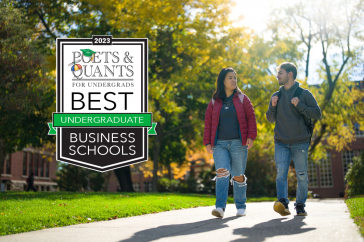
Tate Aldrich '08
When Tate Aldrich '08 graduated from UNH, he knew exactly where he wanted to go to begin his teaching career: back to his hometown of Laconia.
“I wanted to give back to my community,” he says. “I had so many great teachers, coaches and mentors when I was a student in the Laconia school district that, when I had the opportunity to go back, there was no hesitation.”
Aldrich began teaching English at Laconia High School in the fall of 2009, and during the last eight years, he’s made community, compassion and critical thinking the pillars of his teaching philosophy. Now, he’s being recognized for his efforts — in September, the state Department of Education named Aldrich as New Hampshire’s 2017 Teacher of the Year. Now in the running for the national Teacher of the Year award, Aldrich says he’s the teacher he is today thanks to growing up in Laconia and his years at UNH.
“My job as a public servant is to recognize what my community requires from me.?As a teacher, I wouldn’t be doing my job as a public servant if I didn’t go beyond the curriculum.”
“I can’t express enough how much I loved my four years at UNH,” says Aldrich. “I think UNH has to be the best teaching school in the state.”
According to Aldrich, his first few years at Laconia High School changed his attitudes about teaching. He “knew what it was to teach, but didn’t know what it meant to serve,” he says. Delivering instruction based on a curriculum is only part of the job — students have complex, multifaceted lives outside the classroom, Aldrich says, and the communities they live in are similarly complex. To help students succeed, Aldrich believes teachers must engage holistically with the communities they work in.
“I believe every student has the capacity to think critically and the ability to access other people’s humanity,” he says. “Teaching should be a mutually informative experience. I should learn as much from my students as they learn from me.”
For Aldrich, the revelation came during a particularly difficult year. He began to see how hunger and food insecurity affected his students. And like other communities, Laconia faced the tragedy of the opioid epidemic gripping the state. “There was a year’s time when I had ex-students die of heroin overdoses, current students’ parents die of heroin overdoses and former (LHS) classmates of mine die of heroin overdoses,” Aldrich says. “I could no longer ignore the problem and had to ask myself, why is this happening to people in my community?”
Aldrich began working with Got Lunch!, a local group that provides food for children in need during the summer, and Stand Up Laconia, a community group that advocates for the prevention, treatment and recovery from substance misuse. Aldrich partnered with Got Lunch! to host the city’s first school-wide spelling bee, a fundraiser that collected more than 300 non-perishable food items.
“My job as a public servant is to recognize what my community requires from me,” he says. “In Laconia, more than 60 percent of the student body qualifies for free or reduced lunch, so I have students who sometimes go hungry during the summer. As a teacher, I wouldn’t be doing my job as a public servant if I didn’t go beyond the curriculum.”
Aldrich became head of the English department little more than a year ago. His time at UNH helped shape him into the teacher he would become, he says, adding, “My mind and my heart were both shaped by the classes I attended, the people I met and the experiences I had.”
One of his instructors, Leah Williams, a senior lecturer in English, says she isn’t surprised at Aldrich’s success.
“He was such a thoughtful contributor to discussion, and his comments on readings and peers’ stories revealed insight, humor and empathy,” Williams says. “It’s a joy to discover what he’s been up to and to see him awarded with such a great honor.”
Making Great Teachers

For Aldrich, that honor is also a responsibility. For the next year, he’ll be traveling far and wide to talk about education and the unique challenges Laconia and other New Hampshire communities are facing. He wants to encourage young people like himself to return to their hometowns and “give back to the communities that gave back to them.”
And there’s still plenty of work to be done inside and outside the classroom. Aldrich has plans for more community events and fundraisers, including an open mic poetry night — inspired by the open mics he took part in while at UNH.
“What we want to achieve is a cultural change,” he says. “In a city where there’s a drug epidemic, where students suffer poverty. If we’re going to change that culture, it’s going to take a lot of time and a lot of initiative beyond school walls.”
Interested in a teaching career? Learn more here.?
-
Written By:
Larry Clow '12G | UNH Cooperative Extension



















































